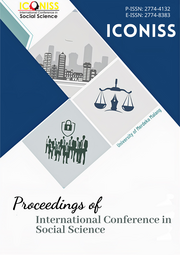Social Assistance Program during the Covid-19 Pandemic
DOI:
https://doi.org/10.26905/iconiss.v3i1.9694Keywords:
Covid-19 Pandemic, Implementation, Poor and vulnerable communities, Social assistance program, Village governmentAbstract
In an effort to implement a social safety net to overcome threats that endanger the national economy and financial system stability for people affected by Covid-19, the Government of the Republic of Indonesia, through the Ministry of Social Affairs, has issued a policy on basic food social assistance and cash social assistance through a decree numbered 54 Years. 2020. However, in the implementation of the social assistance program during the Covid-19 pandemic in Selangkau Village, Kaliorang District, East Kutai Regency, there were problems, including the presence of beneficiaries who were "allegedly" not from the poor and vulnerable, and there were "alleged" beneficiaries, also get other similar social assistance so this of course has caused social jealousy in the midst of society. Based on these problems, this study aims to describe and analyze the implementation of social assistance programs during the Covid-19 pandemic based on the Decree of the Minister of Social Affairs of the Republic of Indonesia Number 54 of 2020 in Selangkau Village, Kaliorang District, East Kutai Regency, and to describe and analyze the factors that influence support and hinder the implementation of social assistance programs during the Covid-19 pandemic. This descriptive-qualitative research was studied based on Edward III's Theory of Public Policy Implementation with data collection techniques through interviews, observations, and documentation; and data analysis techniques through the stages of data condensation, data presentation, and drawing conclusions/verification. The results of this study indicate that: First, the social assistance program during the Covid-19 pandemic based on the Decree of the Minister of Social Affairs of the Republic of Indonesia Number 54 of 2020 in Selangkau Village, Kaliorang District, East Kutai Regency, has been successfully implemented even though there are still some obstacles. Second, the supporting factors for the implementation of the social assistance program during the Covid-19 pandemic were the attitude or high commitment of the leadership elements, and the availability of strong regulations. While the inhibiting factors are the lack of communication with the target group, the lack of competent staff resources, and the lack of coordination with related work units.
Downloads
References
Agustino, L. (2016). Dasar-dasar Kebijakan Publik. Alfabeta.
Dunn, W. N. (2003). Analisis Kebijakan Publik. Gadjah Mada University Press.
Edward III, G. C. (1980). Implementing Public Policy. Congressional Quarterly Press.
Kementerian Sosial Republik Indonesia. Peraturan Menteri Sosial Republik Indonesia No. 1 Tahun 2019 tentang Belanja Bantuan Sosial.
Kementerian Sosial Republik Indonesia. Keputusan Menteri Sosial Republik Indonesia No. 54 Tahun 2020 tentang Pelaksanaan Bantuan Sosial Sembako dan Bantuan Sosial Tunai dalam Penanganan Dampak Covid-19.
Lestyowati, J. (2020). Implementasi Realokasi Anggaran dan Refocussing Kegiatan di Masa Pandemi Covid 19: Studi Kasus BDK Yogyakarta. Simposium Nasional Keuangan Negara 2020.
Mustopadidjaja, A. R. (2002). Kompetensi Aparatus dalam Memikul Tanggung Jawab Otonomi Daerah dalam Sistem Adminstrasi Negara Kesatuan Republik Indonesia. Ceramah Perdana pada Program Magister Managemen Pembangunan Daerah.
Muthiah, N. (2021). Studi Implementasi Program Bantuan Sosial Tunai di Masa Pandemi. The Indonesian Institute Center for Public Policy Research.
Nazir, M. (1998). Metode Penelitian. Ghalia Indonesia.
Pemerintah Daerah Provinsi Banten). Jurnal Ilmu Administrasi Media Pengembangan Ilmu dan Praktek Administrasi, 19(2).
Sanjaya, N. (2020). Kebijaksanaan Penganggaran Daerah di Masa Pandemi Covid-19 (Studi Kasus pada
Subarsono, A. G. (2005). Analisis Kebijakan Publik, Konsep, Teori, dan Aplikasi. Pustaka Pelajar.
Supriyanto, R. W., Ramdhani, E. R., & Ramadhan, E. (2014). Perlindungan Sosial di Indonesia: Tatangan dan Arah ke Depan. Kementerian BPPN.
Tangkilisan, H. N. S. (2003). Implementasi Kebijakan Publik: Transformasi Pemikiran George Edwards. Lukman Offset & Yayasan Pembaharuan Administrasi Publik Indonesia.
Tangkilisan, H. N. S. (2003). Teori dan Konsep Kebijakan Publik dalam Kebijakan Publik. Lukman Offset dan YPAPI.
Widodo, J. (2010). Analisis Kebijakan Publik. Bayumedia.
Winarno, B. (2007). Kebijakan Publik, Teori, dan Proses. Medpress.
Downloads
Published
Issue
Section
License
Authors who publish in this journal agree to the following terms:
(1)Â Copyright of the published articles will be transferred to the journal as the publisher of the manuscripts. Therefore, the author confirms that the copyright has been managed by the journal.
(2) Publisher of Proceedings of International Conference in Social Science is the University of Merdeka Malang.
(3) The copyright follows Creative Commons Attribution–ShareAlike License (CC BY SA): This license allows to Share — copy and redistribute the material in any medium or format, Adapt — remix, transform, and build upon the material, for any purpose, even commercially.

